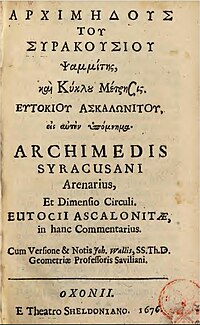The Sand Reckoner

Imagine you are playing with some sand at the beach. You scoop up some sand in your hand and let it fall back onto the ground. You can count how many grains of sand there are, right?
Now, imagine you are an ancient Greek scientist named Archimedes. You love playing with sand too, but you want to know just how many grains of sand there are in the whole universe! That's a big question.
Archimedes had a special way of counting big numbers called the "Sand Reckoner". He wrote a book about it, in which he explained how to write really big numbers down.
The simplest way is to keep adding zeroes. If you have one sand grain, you can write it as 1. If you have ten grains, you write it as 10. If you have a hundred grains, you write it as 100, and so on.
But what if you have more than 1,000 grains? Archimedes had a special way of writing those numbers too. He grouped the zeroes into sets of three. So, 1,000 is one set of three zeroes, or 1 with three zeroes behind it, or 1,000. If you have a million sand grains, that's one set of six zeroes: 1,000,000.
Archimedes didn't stop there though. He wanted to count even bigger numbers! So he kept adding more zeroes. Like, one set of nine zeroes is a billion: 1,000,000,000. One set of 12 zeroes is a trillion: 1,000,000,000,000. And so on.
With the sand reckoner, Archimedes was able to write down really big numbers, like how many grains of sand there might be in the entire universe. And he did it all with just zeroes!
Now, imagine you are an ancient Greek scientist named Archimedes. You love playing with sand too, but you want to know just how many grains of sand there are in the whole universe! That's a big question.
Archimedes had a special way of counting big numbers called the "Sand Reckoner". He wrote a book about it, in which he explained how to write really big numbers down.
The simplest way is to keep adding zeroes. If you have one sand grain, you can write it as 1. If you have ten grains, you write it as 10. If you have a hundred grains, you write it as 100, and so on.
But what if you have more than 1,000 grains? Archimedes had a special way of writing those numbers too. He grouped the zeroes into sets of three. So, 1,000 is one set of three zeroes, or 1 with three zeroes behind it, or 1,000. If you have a million sand grains, that's one set of six zeroes: 1,000,000.
Archimedes didn't stop there though. He wanted to count even bigger numbers! So he kept adding more zeroes. Like, one set of nine zeroes is a billion: 1,000,000,000. One set of 12 zeroes is a trillion: 1,000,000,000,000. And so on.
With the sand reckoner, Archimedes was able to write down really big numbers, like how many grains of sand there might be in the entire universe. And he did it all with just zeroes!
